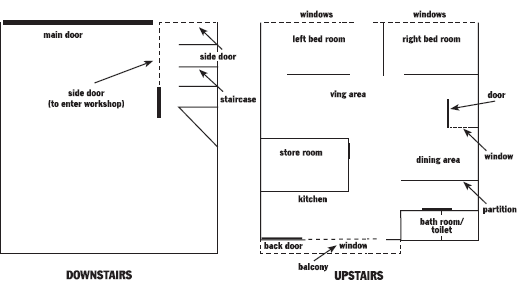 |
|
 |

Media Releases

 |

 |
 |
 |
 |

Q&A - The Sun Property Plus 31th March 2006
| Q. |
|
I would like to consult your expertise with regards to the 2- storey shophouse (see image) that my family and I currently live in. It faces South (S2) while the entrance downstairs is a side door located in the Southwest sector that also faces South (S2). The downstairs area is our workshop. Immediately in front of this door is the staircase that leads to a door on the right. The door is located
in the West sector and also faces West. This door opens to the living room. When applying feng shui to my home, which direction should I face? Do I take into account the directions of both floors, or only upstairs where we live? What is the direction of our living space upstairs, and which direction should we face? Also, if I were to place a water feature upstairs, where should I put it and in which direction? My neighbour on the right directly faces a T-junction, and my room upstairs looks out to this T-junction. I have been told that this T-junction has adverse effects on my home's feng shui, which is apparently the cause of my nightmares and sleep disorders. I would appreciate your advice as to how to remedy the situation as I am unable to move to another room.


|
 |
| A. |
|
What you have with your shophouse and home is quite suitable for a person who belongs to the East group (Kan, Zhen. Xun and Li Gus or Gua numbers 1, 3, 4, and 9). The direction of your workshop is considered South, while your upstairs residence is considered to be facing either South or West. As you have not mentioned your life gua, I cannot comment on what direction is most auspicious or suitable.
Assuming that you are an East group person (Kan, Zhen, Xun and Li Gus or Gua numbers 1, 3, 4, and 9), I would recommend that you sleep in the Southeast room, and change the direction of your upstairs door to face South, if possible. If my assumption that you are an East group person is correct, your sleep disorders can be relieved by moving your bed so that the headboard faces South. For your water feature, I would advice against it until a proper examination is done on your property. This is because the placement of a water feature would need to be very accurate and it is impossible to locate the exact position and direction from the attached plan alone.
|
|
| Q. |
|
According to your forecast, the month of March is inauspicious for the Dragon. You have predicted that it is also not a good month for fortune and relationships. As I am born under the sign of the Dragon, I would like to know if it would be all right to venture into business investments in March. Should I put it off until April, which has been predicted to be a smoother month, especially in terms of wealth?
|
 |
| A. |
|
In the year of the Dragon, it is wise to be additionally cautious. It is better to avoid any major enterprise during the third lunar month (March 29 to April 27). This is not to say that you should not make investments during that time but if you need to (as otherwise the window of opportunity is lost) then make sure that you do all your homework first.
|
|
| Q. |
|
Placing objects such as crystals, wind chimes and mirrors to generate positive chi is a popular thing these days. Is it part of classical feng shui?
|
 |
| A. |
|
Qi is part of the environment. It is considered one of the primal forces of Nature and cannot be generated. Feng shui is about tapping the natural qi of the environment in a manner that benefits the household. In traditional feng shui, crystals are sometimes used to activate certain areas where one requires the earth type of qi. The crystal itself does not generate any qi but it activates the existing qi of a given location in such a manner that the qi can be considered to have the qualities of earth qi (one of the 5 elements). What is important here is again the location. Crystals should not be simply placed as it can activate inauspicious locations. Metal wind chimes are again an activator of qi but does not generate qi. The qi that is activated has the qualities of metal and, in the right place, can be used to activate or ward off certain bad qi normally associated with the earth qualities (metal weakens the earth). It must be made of metal and placed in the right place to be effective. Mirrors are normally used to reflect or disperse, depending on the shape. Again, it cannot generate any qi. So, the use of objects like crystals, wind chimes and mirrors is part of classical feng shui. What differentiates classical feng shui from other forms is the method of usage and the placement of the items.
|
Master Yap Boh Chu is the son of Grand Master Yap Cheng Hai. He co-founded the Yap Cheng Hai Academy to propagate the proper teaching and practice of classical feng shui and qi gong.
Yap Cheng Hai Academy Sdn Bhd
Tel: (03) 2070 8009; Fax: (03) 2072 8009; E-mail: info@ychacademy.com
Disclaimer: Yap Cheng Hai Academy Sdn Bhd does not, and cannot, in any way whatsoever or howsoever represent, warrant or guarantee that the recommendations given in this column mean that the happiness and good fortune of the person(s) who put these
recommendations into practice will naturally or necessarily follow


|
 |
|
 |
 |
|
 |
|
 |